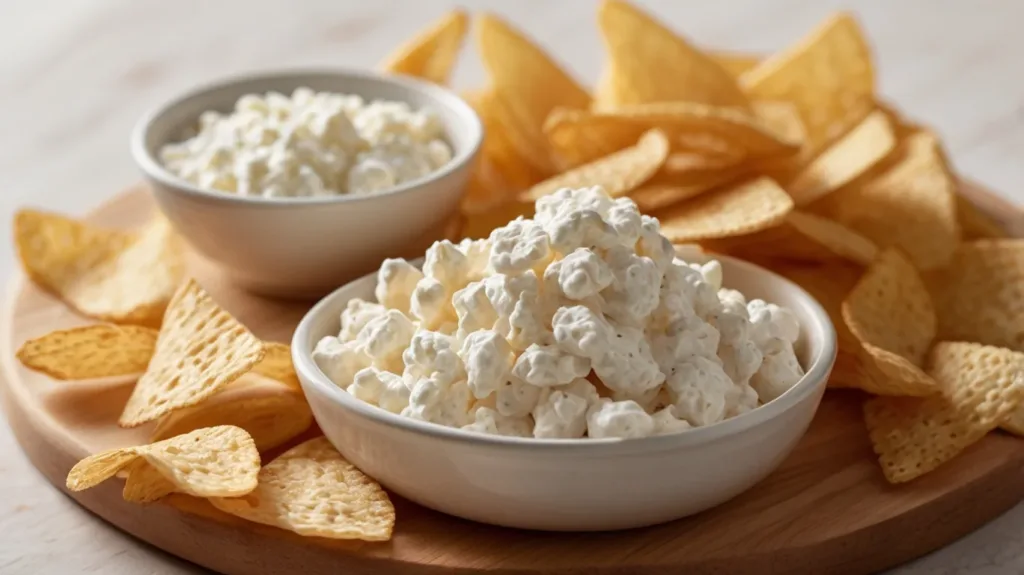Introduction to Cottage Cheese Chips
Cottage cheese chips are becoming a popular snack among health-conscious individuals and food enthusiasts alike. With their crunchy texture and savory flavor, they are a lighter alternative to traditional chips, often marketed as a healthy snack choice. The increasing interest in high-protein, low-carb, and gluten-free foods has made wafers cheese chips a sought-after option for people looking to maintain a balanced diet without compromising on taste.
Why Wafers Cheese Chips Are Gaining Popularity
Cottage cheese chips have earned their place in the snack world for a number of reasons. First and foremost, they offer a satisfying crunch while being lower in calories compared to traditional potato chips. This makes them an appealing option for people looking to reduce their calorie intake without giving up the enjoyment of a crispy snack.
Cottage cheese is naturally rich in protein, which helps you feel fuller for longer. For those on a high-protein diet, wafers cheese chips are a convenient, protein-packed snack. They also fit various dietary needs, such as low-carb, gluten-free, and ketogenic diets. This versatility has contributed to their growing popularity. From fitness enthusiasts to those with dietary restrictions, many people are enjoying these chips.
In addition to being nutritious, wafers cheese chips often come in a variety of flavors, adding to their appeal. Whether you prefer something savory, spicy, or even sweet, there’s likely a flavor to suit your taste.
wafers cheese chips offer a satisfying crunch while being lower in calories compared to traditional potato chips. For more quick meal ideas, see our 15-Minute Meals for Busy Moms.

Who Should Care About Cottage Cheese Chips?
Anyone looking to make healthier snack choices can benefit from wafers cheese chips. For those trying to lose weight or maintain a healthy weight, these chips offer a low-calorie option that doesn’t sacrifice flavor. They’re also ideal for individuals following specific dietary plans, such as those who are lactose intolerant, gluten-sensitive, or following a keto or low-carb diet.
They’re ideal for individuals following specific dietary plans, such as those on a low-carb or ketogenic diet. You can find more keto-friendly meal prep ideas in our Keto Meal Prep Ideas.
Key Benefits of Cottage Cheese Chips
Cottage cheese chips offer a range of benefits. They are an excellent source of protein, which helps with muscle repair and satiety. They are also lower in carbs and sugars than traditional chips, making them a better choice for those monitoring their carbohydrate intake. Furthermore, they are often gluten-free, making them suitable for those with gluten sensitivities.
Addressing Common Misconceptions
Some people may think cheesy Chips are too processed or high in sodium, but many brands offer options with minimal additives and lower salt content. It’s essential to read labels and choose brands that focus on healthy ingredients for the best nutritional value.
Historical Context of Cottage Cheese and Its Variations
Cottage cheese has been around for centuries, often used as a source of protein in many cultures. Over time, it has evolved into various forms, including reduced-fat and fat-free versions. With the rise of health-conscious eating habits, it has been reimagined in new ways, including as the base for wafers cheese chips. This evolution is part of a broader trend toward healthier, more innovative snack options.
How Cottage Cheese Chips Are Different from Other Snacks
Unlike regular potato chips or tortilla chips, wafers cheese chips are often baked rather than fried, resulting in fewer calories and less fat. The use of wafers cheese as a primary ingredient also makes them a good source of protein, a nutrient not typically found in traditional chips. These differences make wafers cheese chips a standout choice for those seeking a more balanced snack.
Nutritional Breakdown of Cottage Cheese Chips

Cottage cheese chips are more than just a crunchy snack—they offer a host of nutritional benefits. Understanding the nutritional breakdown is crucial for anyone considering incorporating them into their diet. Let’s take a closer look at what’s inside these chips and why they can be a better option compared to other traditional snacks.
What’s Inside Cottage Cheese?
Cottage cheese is a dairy product made by curdling milk and separating the curds from the whey. It is naturally rich in protein, calcium, and several important vitamins and minerals. A single serving of it provides a good amount of protein, making it an excellent food choice for building muscle and maintaining overall health.
In addition to protein, cottage cheese contains essential nutrients like phosphorus, which helps in maintaining strong bones, and B vitamins, which are important for energy production. While cottage cheese is low in fat, it still contains healthy fats that are beneficial for overall health when consumed in moderation. These qualities make cottage cheese a great base for chips, giving them both taste and nutritional value.
How Many Calories Are in a Cottage Cheese Chip?
The number of calories in cottage cheese chips can vary based on the brand and ingredients used. On average, a serving of the wafers cheese chips (about one ounce or 28 grams) contains roughly 120 to 150 calories. This makes them a relatively low-calorie snack option compared to regular potato chips, which can have around 150-160 calories per ounce.
Understanding the Calories in wafers cheese Chips
Most of the calories in cottage cheese chips come from the protein and fat content of the cottage cheese itself, with a smaller portion from other ingredients such as seasoning and oils used during baking. Since wafers cheese is lower in fat than other dairy products, these chips are generally less calorie-dense than many other snacks on the market.
When choosing cheesy Chips, it’s important to check the serving size and the ingredients list. Some brands may use extra oils or additives that can increase the calorie count, while others focus on keeping the snack healthier with fewer added ingredients.
Calories in Popular Serving Sizes
A typical serving size of wafers cheese chips is about 1 ounce. However, serving sizes can vary between brands. Some people may consume larger portions, so it’s helpful to be mindful of the total calories consumed in one sitting. For example, if you eat two or three ounces, you could be consuming 240 to 450 calories, depending on the brand and the specific ingredients used.
Key Nutrients
wafers cheese chips offer several essential nutrients that are important for health. Their nutritional profile can vary slightly based on the brand, but here are the key nutrients you should know about.
Protein Content of Cottage Cheese Chips
One of the main reasons people turn to cheesy Chips is their high protein content. Protein is an essential macronutrient that helps in muscle repair and growth, and it also contributes to satiety, helping you feel fuller for longer. A serving of wafers cheese chips can provide around 6 to 9 grams of protein, depending on the brand.
This makes them an excellent choice for anyone looking to increase their protein intake without consuming excess calories. For example, athletes or those on high-protein diets can benefit from using Cheese Crisps chips as a snack that supports their nutritional goals.
Carbohydrates and Fats in Cottage Cheese Chips
Cottage cheese chips are low in carbohydrates, making them popular for low-carb and ketogenic diets. A typical serving contains around 6 to 10 grams of carbohydrates. Most of these carbs come from fiber and natural sugars found in the wafers cheese itself.
Regarding fats, cottage cheese chips contain a moderate amount, primarily coming from the cheese and any oils used during baking. These fats are generally considered healthy fats, which are beneficial for heart health. However, some brands may add extra oils, so it’s important to check labels if you’re aiming to reduce your fat intake.
Does Cottage Cheese Have a Lot of Carbs?
Cheesy Crunch is relatively low in carbs, with about 6 grams of carbohydrates per 100-gram serving. This makes it a good option for those watching their carb intake. When used in Cheesy Chips, the overall carb content remains low, especially compared to other snack options like potato chips, which are higher in starch.
How to Enjoy Cottage Cheese Chips Without Overindulging

Cheesy Chips are a healthier snack option, but moderation is key. Overindulging, even with nutritious snacks, can lead to consuming more calories than planned. To prevent this, try following these helpful tips:
First, be mindful of portion sizes. A single serving of wafers cheese chips typically contains around 120-150 calories, but it’s easy to lose track if you’re eating directly from the bag. Instead, portion out a serving and enjoy it slowly, savoring each bite. This helps prevent overeating and keeps your calorie intake in check.
Second, balance your diet. Cheesy Chips are a great addition to your snack options, but they shouldn’t replace whole foods like fruits, vegetables, and lean proteins. Try pairing them with a side of fresh veggies or a piece of fruit to add more fiber and nutrients to your snack.
Lastly, avoid consuming wafers cheese chips late at night, as this can lead to mindless snacking. Instead, enjoy them as part of a balanced afternoon snack to help keep you energized throughout the day.
Tips for Choosing the Best Cottage Cheese Chips
Not all cottage cheese chips are created equal. When selecting a brand, consider the following factors to ensure you’re making the healthiest choice:
Look for Simple, Whole Ingredients
Choose wafers cheese chips made from minimal ingredients, with no added preservatives, artificial flavors, or colors. Ideally, the chips should contain high-quality wafers cheese, a healthy oil (like olive oil), and seasonings that you can easily recognize. The fewer the ingredients, the better the snack.
Check the Nutritional Label
While cheesy Chips are generally a healthier alternative to traditional chips, some brands may add extra sugar, sodium, or unhealthy fats. Always check the nutrition label to ensure you’re choosing a product that fits your dietary needs. Look for options with lower sodium and fat content, especially if you’re watching your salt intake.
Consider Flavor Options
Cottage cheese chips come in a variety of flavors. If you’re looking to reduce your calorie intake, opt for the more basic flavors, like sea salt or garlic, which tend to have fewer additives. More complex flavors like barbecue or sour cream may contain extra ingredients that could increase the calorie count.
How to Make Cottage Cheese Chips at Home

Making wafers cheese chips at home is an easy and cost-effective way to enjoy this healthy snack. To make your own, start by spreading wafers cheese on a baking sheet in a thin, even layer. Add your favorite seasonings, such as salt, pepper, or garlic powder. Bake the mixture at a low temperature (around 200°F) for several hours until it becomes crisp. Let it cool, and you’ll have homemade chips that are free from any unwanted additives.
Healthy Alternatives for Store-Bought Options
If you prefer to buy ready-made chips, there are plenty of healthy options available. Look for brands that focus on using natural ingredients and offer chips that are lower in fat and sodium. Some brands even use plant-based oils, making them a great option for those following a plant-based diet.
Portion Control and Serving Suggestions
Portion control is key when enjoying wafers cheese Wafers. Stick to the recommended serving size of one ounce (about 10-15 chips) to keep your calorie intake in check. Pairing the chips with a nutritious dip, such as hummus or guacamole, can also help make them a more balanced snack.
Wrapping Up: Is Cheesy Chips a Healthy Snack Option?
Cottage cheese chips can be part of a healthy diet when eaten in moderation. They provide a good source of protein and are lower in calories than regular chips. They also cater to various dietary needs. However, it’s important to choose carefully by checking nutritional labels. Avoid products high in sodium or unhealthy fats.
By practicing portion control and combining them with a balanced diet, wafers cheese chips can be a satisfying, nutritious snack. Whether store-bought or homemade, they’re a great alternative to traditional chips.
Resources for Further Exploration
For more information on the nutritional benefits of wafers cheese and healthy snack ideas, consider visiting reputable websites like the Academy of Nutrition and Dietetics or the USDA’s Food Database. These resources offer in-depth details on the best ways to incorporate wafers cheese into your diet, along with healthy recipe ideas.
FAQs About Cottage Cheese Chips
FAQ: How many calories are in 1 cup of whole cottage cheese?
A cup of whole cottage cheese typically contains around 220-240 calories, depending on the brand and fat content. It’s important to check the label for specific calorie counts, especially if you’re following a specific diet plan.
FAQ: Does cottage cheese have a lot of carbs?
Cottage cheese is relatively low in carbohydrates, with around 6 grams per 100-gram serving. This makes it a good choice for low-carb or ketogenic diets, especially when compared to other dairy products.
FAQ: How many calories in a small bowl of cottage cheese?
A small bowl of wafers cheese, typically around ½ cup (about 120 grams), contains approximately 100-120 calories. The calorie count will vary based on the fat content and whether it’s full-fat or low-fat cottage cheese.
FAQ: How many calories in a whole tub of cottage cheese?
The calorie count in a whole tub of cottage cheese varies by size and fat content. For example, a 16-ounce tub of full-fat cottage cheese can contain around 450-500 calories, while a low-fat version may contain fewer calories.
FAQ: Can cottage cheese chips be a part of a low-calorie diet?
Yes, Cheesy Chips can fit into a low-calorie diet, as long as portion sizes are kept in check. A serving of these chips typically contains around 120-150 calories, making them a healthier alternative to higher-calorie snacks like regular potato chips.
FAQ: Are cottage cheese chips gluten-free?
Many brands of Cheesy Chips are gluten-free, but it’s essential to check the packaging to ensure there are no gluten-containing ingredients. If you’re sensitive to gluten, opt for brands that specifically label their products as gluten-free.
FAQ: How can I make cottage cheese chips crispy?
To make cottage cheese chips crispy, bake them at a low temperature (around 200°F) for an extended period, allowing the moisture to evaporate. The longer they bake, the crunchier they become, but be sure to check on them frequently to prevent burning.

